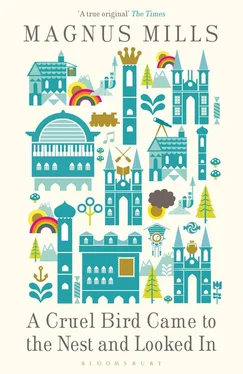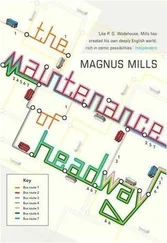Smew turned to Whimbrel. ‘What about you?’ he said. ‘Didn’t you see anything through your telescope?’
‘Wait a minute,’ I interjected. ‘It’s not Whimbrel’s fault. He only gets one sixpence at a time.’
‘Besides which,’ said Whimbrel, ‘I’m supposed to be looking at the stars, not the approach of railways.’
‘Quarrelling isn’t going to get us anywhere,’ said Dotterel. ‘Shouldn’t we decide what we’re going to do?’
‘Agreed,’ said Wryneck.
‘One fact is for certain,’ said Smew. ‘We don’t need a railway.’
A murmur of assent passed around the table.
‘This empire was built on seafaring,’ he continued. ‘We have always travelled by ship and no other means of transport are required. A railway will only bring unwelcome influences.’
‘Such as?’ I asked.
‘The customs of the east,’ said Smew. ‘We don’t want them here.’
‘But doesn’t the railway represent progress?’ said Dotterel. ‘Resisting it would be like trying to stop the tide from turning.’
‘Progress doesn’t bring improvement,’ declared Smew. ‘It just makes people think they’re cleverer than they actually are.’
‘We can’t have that,’ said Wryneck.
‘Of course we can’t,’ said Smew.
‘What I want to know,’ said Garganey, ‘is how they had the audacity to build this railway without consulting us?’
‘I imagine,’ said Smew, ‘that it’s the product of a so-called friendly city: the kind I discussed in my recent talks. Here we see a typical example of the way they operate. They simply drive forward, meeting each obstruction as it comes. It seems that one such city is flourishing particularly well at the moment. History suggests it will be at the expense of others.’
‘Not us, though, surely?’ said Whimbrel.
‘As long as we’re vigilant, no,’ replied Smew, ‘but we need to consider our options carefully.’
‘Why don’t we send a delegation?’ I said. ‘Then we could speak with the railwaymen and find out their intentions.’
‘That would be an indication of weakness,’ said Wryneck. ‘Far better if we wait until they come to us.’
‘Agreed,’ said Smew. ‘We must carry on as normal and make it clear that their presence will have no effect on our way of life.’
During the course of the meeting the sky had been darkening steadily. A glance at the clock told me it was half past twelve. There was no sign of rain, yet the light continued to deteriorate. It then occurred to me that the descending murk had nothing to do with the weather: what I was witnessing was the onset of dusk. Nobody else appeared to notice, however, so I didn’t say anything.
There was a knock on the door and Shrike came in. He approached Smew and bowed. ‘The post has arrived, my liege.’
There was only one item: a letter in a brown envelope bearing an unusual postmark. Smew opened it.
‘Confounded cheek!’ he exclaimed. ‘They’ve sent an invoice for the construction of the railway.’
‘Well, we’re not paying it,’ uttered Brambling. ‘The imperial funds aren’t for white elephants.’
Smew was still peering at the invoice. ‘I’m afraid we may not have any choice,’ he said. ‘Apparently the order was signed by the emperor himself.’
We all gasped in disbelief.
‘Well he might at least have told us!’ snapped Dotterel.
‘Maybe he did,’ said Whimbrel. ‘Perhaps his letter was lost in the post.’
Everybody looked at Garganey, as though this was all somehow his fault.
‘Don’t blame me,’ he said. ‘The emperor’s landed us with this railway when we didn’t even ask for one.’
‘If you don’t ask you don’t get,’ said Sanderling.
During this discussion, Shrike had been waiting patiently in the corner of the room. Now, having observed the turmoil caused by the invoice, he quietly departed.
‘We shouldn’t argue in front of the serfs,’ I said. ‘It doesn’t look very good at all.’
‘Actually, Shrike is no longer a serf,’ said Smew. ‘I’ve had him raised to a commoner.’
Smew made this announcement in a very lofty tone of voice. He was sitting in the emperor’s chair, and as usual displayed all the confidence of a natural ruler.
‘May we take it that you intend to continue as regent?’ asked Garganey.
‘Correct,’ said Smew. He handed the invoice to Brambling. ‘Your department, I believe.’
Brambling examined the figures and his eyes widened.
‘Good grief,’ he said. ‘I’ll need to trawl the coffers.’
On Wryneck’s suggestion, Brambling was dispatched to the counting house to do some reckoning. Meanwhile, the rest of the cabinet agreed that we would play a waiting game.
‘If they want money they’re going to have to come and get it,’ concluded Smew.
Darkness had fallen by the time our deliberations were over. Nobody passed comment that it was still only three in the afternoon, and I therefore assumed everyone was quite satisfied with the ‘new’ hours. The temptation, of course, was to head directly for the Maypole where the lights would be glowing and the log fire roaring. Indeed, the place was thronging when I passed it by. The twelve-day feast was almost upon us and the people were clearly getting in the mood. Nevertheless, I had a more important matter on my mind. The pleasures of the Maypole would have to wait.
I wanted to look into this question of Greylag’s freedom, so I went to the library and perused the bookshelves. Smew’s revelation that Shrike had been raised to a commoner was encouraging, but actually I thought Greylag deserved better. Eventually I found what I was seeking: the correct term in Greylag’s case was ‘manumission’. According to the records, a serf granted manumission would become a freeman, a step above mere commoners in the feudal system. This, I decided, was what I should try and strive towards.
I drifted into the reading room and noticed that Smew had left his crown unattended on the desk by the bay window. I picked it up and glanced inside the rim. It came as no surprise to see the letters CoS stamped there.
‘Probably an import,’ said a voice behind me.
I turned to see Dotterel standing in the doorway.
‘A cheap one at that,’ I remarked.
‘I expect it came in from the east,’ he said. ‘Not directly, though. It most likely found its way here via the colonies.’
The crown felt tinny and insubstantial in my hands. Casually I tossed it over to Dotterel.
‘Rather careless of Smew to leave it lying around,’ he said. ‘I’ve a good mind to confiscate it.’
‘On what grounds?’ I asked.
‘On the grounds that I’m custodian of the imperial artefacts,’ he said. ‘In the last resort I’m responsible for the upkeep of this crown: that’s why it was in the royal workshop in the first place.’
He began buffing up the crown with his handkerchief.
‘We had to straighten all the prongs,’ he continued, ‘and apply a new coat of gold paint. In terms of time spent it would have been much cheaper to get a replacement.’
‘Couldn’t they make a new one,’ I suggested, ‘in the workshop?’
Dotterel shook his head. ‘We don’t make anything in this country,’ he said. ‘Not any more. We just carry out repairs.’
He put the gleaming crown back on the desk.
‘That’s better,’ he said.
‘Did you come here especially to give it a polish?’ I enquired.
‘Actually, no,’ said Dotterel. ‘I wanted to return this.’
He reached into his pocket and produced a textbook.
‘It’s the play we’ve been rehearsing,’ he explained. ‘I won’t need it now.’
He went to the bookshelves and put it back with the other copies.
Читать дальше












